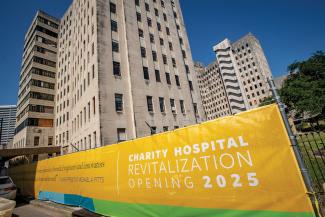The American landscape is filled with cities from Pittsburgh to Nashville, from Raleigh to Austin, and numerous points in between, that have been transformed from their core outward by the presence of a major national research university downtown. This is the destiny of Tulane and New Orleans.
We are currently investing more than $1 billion in construction and renovations in New Orleans. Much of this effort is focused downtown, where the university already occupies 17 buildings. This includes the recently opened Thirteen15, a vacant hotel on the edge of Duncan Plaza that is now a modern apartment building quickly filling up with students, scholars, doctors and researchers.
Work is also currently underway to transform the long-dormant Charity Hospital building into a thriving center of innovation, education and discovery. This New Orleans icon will soon house state-of-the-art labs, classrooms and an innovation institute that will help boost breakthroughs and discoveries from Tulane and other local universities and lead to the creation of new businesses that will bring these inventions to market faster. This promises to spur economic development, including well-paying jobs, throughout New Orleans and the region.
Our downtown campus, located in the heart of New Orleans’ BioDistrict, offers a once-in-a-generation chance to elevate our national standing as a research and innovation powerhouse and support the growth of small businesses. We can become home to not only great food and music, but a center for discoveries such as the rapid COVID-19 tests created at Tulane or our advances in brain science. The city that care forgot can produce diagnostics, therapeutics and treatments to heal our world as well as economic opportunity for all.
Such a city will keep graduates of Tulane and other Louisiana universities and community and technical colleges here in our home state, while welcoming new residents.
With the help of New Orleanians from all backgrounds and leaders in local government, business, research and educational institutions, we can move our beloved city forward via a new path paved by innovation and research-based entrepreneurship.
In the age of pandemics and graying populations, in the time of CRISPR and other revolutionary advancements, the need and opportunity to create such a city has never been greater. A city rooted in the past and focused on the future and the promise of discovery cannot help but achieve greatness.
Reprinted excerpt from The Times-Picayune | NOLA.com, published prior to LCMC Health/Tulane partnership announcement































































